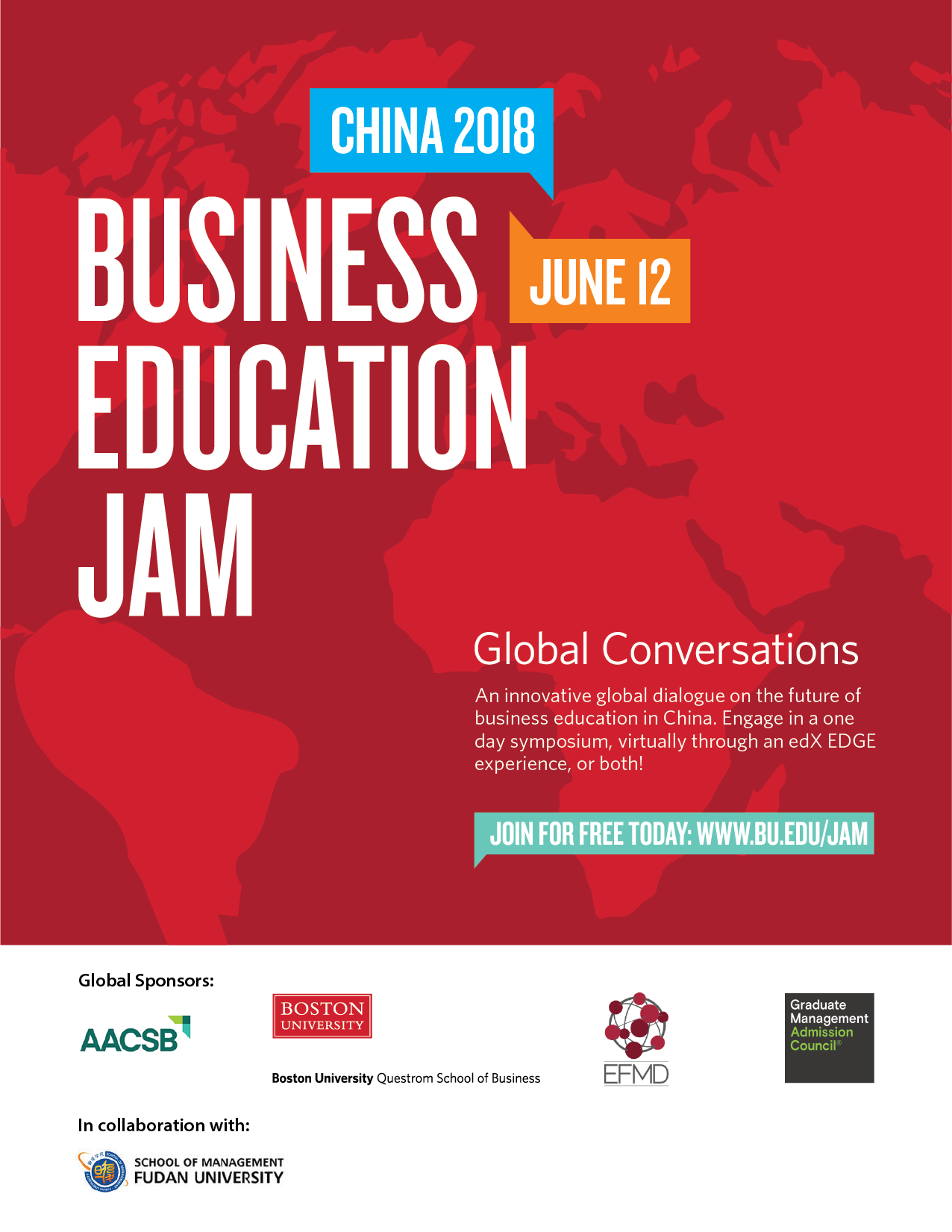China Jam: June 2018

China Jam: June 2018 was the third event in this series of regionally focused dialogues on business education.
Topics discussed included:
- How might Business Schools leverage on the new Digital Mode of Learning?
- How might Business Schools foster greater Diversity and Inclusion?
- How might Business Schools include Entrepreneurship into the curriculum?
- How might Business Schools create Lifelong Learning?
- How might Business Schools make an Impact on Society?
A summary of findings included:
1) Capacity: It’s clear that China needs to expand the capacity to educate top-tier business managers capable to lead China into the next phase of global prominence. This is true of the private sector and the State-owned Enterprises. Equally important is the need to enhance the capacity of faculty—at the intersection of research and teaching—to both create knowledge about China business in global context as well as teach about the leading business theories, applications, practices and frameworks.
2) Cases: The broader world is badly in need of business cases about China. The business school curriculum is overly weighted towards US and Western practices and that is a deficiency that must be corrected. How can Chinese business institutions create world-class cases for use not only in China but more broadly all across the world. This is more acute as China steps forward as a global economic power, shedding the label of the past—emerging economy.
3) Curriculum: There was some discussion—somewhat heated— about teaching entrepreneurship. We made the distinction between curriculum focused on Zero to One (creation of an enterprise with a powerful idea) and One to N —ascaling up the idea to be profitable. Historically, business schools focused on the latter; there’s need to focus on the latter. How best do we dovetail the two different—but important—phases of business evolution, especially the increasing importance of entrepreneurship and innovation in China (with next-generation digital technologies)?
4) Competency: MBA programs have focused on concepts, frameworks and tools that help students and managers deal with the complexity of running business organizations. How should we balance the need for critical thinking (problem framing) with education about tools for problem solving?
5) Course Design: One group eloquently used the questions of (1) What, (2) How (3) Where and (4) When to frame the challenges of designing the courses to bring multiple perspectives to the topics and themes taught in the class. E.g., How do we bring experiential, immersive teaching to complement traditional concepts and foundations? This is worth exploring as we strive to innovate more holistically than incremental adjustments by adding one or grew topics or one or two focused interventions. The designs must also respond to the learning modes for the Millennials and take into account the potential role of online (digital) approaches.
6) Confidence: The need for Chinese managers to be prepared to run global corporations was highlighted by many. The programs must instill the necessary confidence including language skills as well as forward-focused concepts and approaches for Chinese companies to be truly world class. And in this regard, much is expected of the next-generation of business graduates.
7) Content: China’s future is rooted in digital innovations (AI, Machine Learning, Analytics etc.) as well as big infrastructure such as Belt-Road initiative. How can business schools use such developments for both research (develop unique insights) as well as teach relevant content for the managers—including those that may come back to schools for refresher courses?
8) Collaboration: Chinese business schools should further build on long-established collaboration with industry and Government. Such partnerships will go a long way to make sure that the cases are relevant and prepared for the global, worldwide audience. The industry and the Government are interested in making sure that the broader community of business school educators and teachers appreciate the transforming role of China. Funding may also required to accelerate the capacity (point #1 above).
9) Conversations: This forum started the conversations amongst the key stakeholders but this event is not the end. It’s the beginning of ongoing conversations and we hope that you do raise issues and offer suggestions to improve the overall level breadth and depth of understanding about Chinese business not only for the local audience but also for the global audience.


